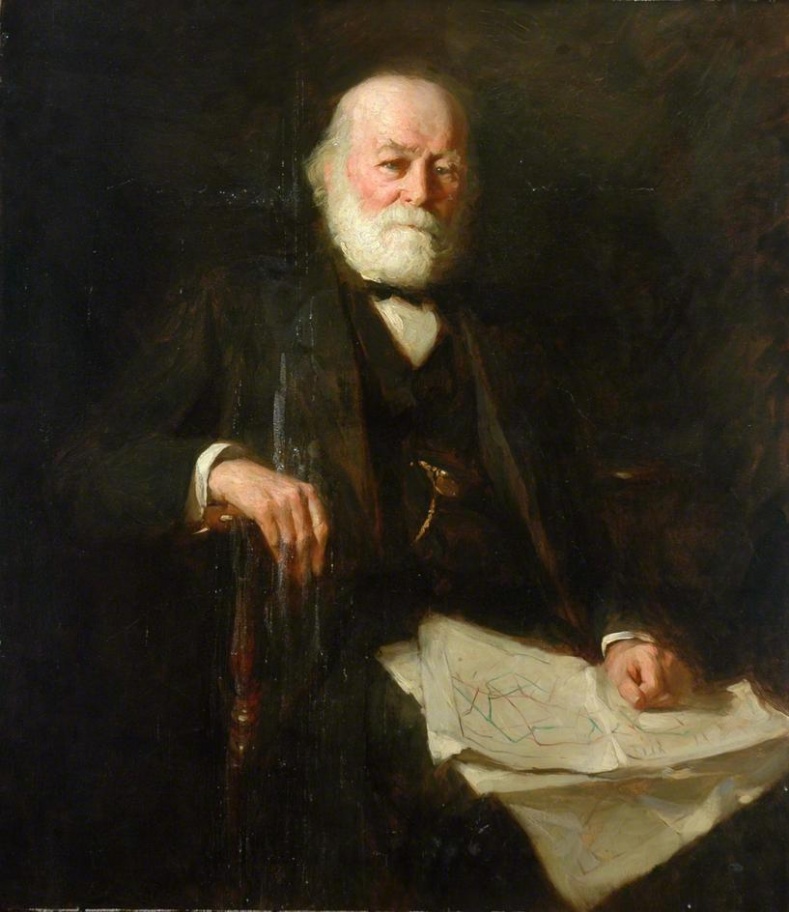
Bell, Sir Isaac Lowthian
1816-1904
Industrialist
Isaac Lowthian Bell was the son of Thomas Bell (1774-1845). He was a partner in the ‘Losh Wilson and Bell’ ironworks in Walker, Newcastle. Thomas took the education of his four sons very seriously and enrolled them at Dr Bruce’s academy in Newcastle. Thomas wanted Isaac, the eldest son, to have a full understanding of how commerce and industry worked.
The industrial revolution, begun in Britain towards the end of the 18th century, had spread across Europe as resources and innovations were shared. Thomas recognised the benefit of immersing Isaac in the growth of business across the continent as each country’s scientific and business community discovered its own unique strengths and opportunities. Isaac was sent to study in Germany, then Denmark and at Edinburgh University. He completed his scientific education in 1835 at the Sorbonne, Paris, before finally returning to Newcastle at the age of 19 to join his father at the Walker ironworks.
Though he would inherit the Losh, Wilson and Bell Company from his father, Lowthian was determined to make his own fortune and exercise his own creativity within the industrial domain. To that end, a year before his father’s death, he moved further east along the Tyne and in 1844 established with his brothers Thomas and John the Bell Bros company at Wylam. Six years later the company expanded south to take advantage of superior iron ore on Teesside.
Lowthian was recognised not only for his successes in business but as an authority on the theoretical aspects of science and industry. He wrote academic papers for the Journal of the Iron and Steel Institute and published two papers which helped develop the process of steel manufacturing. He continued to travel to Europe and America to learn new industrial techniques, bringing them back to England and introducing them to the North East. One example is time spent in France in 1875 learning the practice of pumping hot water 350 meters underground to extract subterranean salt, the same year Lowthian was elected as a Fellow of the Royal Society.
Lowthian travelled throughout his life, for business and pleasure, but he remained rooted in the North East. He was the Liberal MP for Hartlepool from 1875, Sheriff and Mayor of Newcastle in 1851, 1854 and 1862 and instrumental as the director of North East Rail from 1865 to 1904. Throughout his life, he had taken his own education as seriously as his father had in his youth. He was a lifelong supporter of the College of Physical Science at Newcastle, donating £4,500 in 1871, the modern equivalent of almost £400,000.
When Lowthian’s wife Margaret (d.1886) passed away he donated his house in Washington to be used an orphanage. The hall provided accommodation for 130 children and provided education in the industry. In 1912, although the Hall kept the name ‘Dame Margaret’s Home’, it became the most northern branch of Dr Barnardos. The orphanage continued to provide a safe haven for children down to the end of World War II but was converted to become a training centre in 1948.
References
Dame Margaret’s Home, Washington. Available here (Accessed: 04/07/2018). *Nb. This source claims Margaret died in 1871, Oxford Dictionary of National Biography states Margaret died in 1886
Lomas, R. (2009.) An encyclopaedia of North-East England, Edinburgh: Birlinn Ltd, pp. 38-9.
Mayhew, S. (2015). A Dictionary of Geography. Oxford: Oxford University Press.
Tweedale, G. (2004), Bell, Sir Isaac Lowthian, first baronet. Available here (Accessed: 04/07/2018).